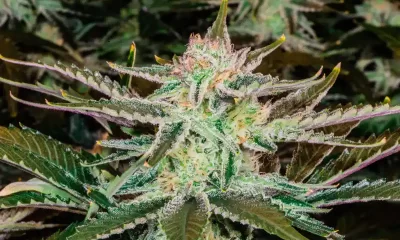Business
Washington State Pays Out $9.4 Million in Refunds Relating to Drug Convictions

Thanks to the 2021 ruling in State v. Blake, countless people have received reimbursements from the state in regard to simple drug possession charges.
In July, Washington State recently opened its online reimbursement center, called the Blake Refund Bureau, to cover court-ordered fines or costs in relation to drug possession convictions. Since then, the state has already approved reimbursements for a total of $276,000.
The Administrative Office of the Courts (AOC) launched the Blake Refund Bureau more than two years after the court ruling was made for State v. Blake in February 2021, when the Washington Superior Court ruled that arresting people for drug possession was unconstitutional.
The foundation of the case involved a woman who received a pair of jeans from a friend in 2016, which had a small bag of methamphetamine hidden in the coin pocket. The state charged her with possession of a controlled substance, but she claimed “unwitting possession” in her defense.
This premise established a discussion of those who unknowingly handle or harbor drugs. According to Justice Sheryl Gordon McCloud, a postal worker can unknowingly deliver packages that contain drugs, or a roommate can hide drugs in a shared living space. “Attaching the harsh penalties of felony conviction, lengthy imprisonment, stigma, and the many collateral consequences that accompany every felony drug conviction to entirely innocent and passive conduct exceeds the legislature’s powers,” Gordon explained.
“In 2021, the Washington State Supreme Court found the law criminalizing drug possession unconstitutional,” AOC stated. “As a result of this decision, known as State v. Blake, any Blake-related convictions qualify to be removed (vacated) from one’s criminal record, and any legal financial obligations (LFOs) paid as a result qualify for financial reimbursement.” Washington State police departments were instructed to no longer arrest people for simple drug possession.
Anyone convicted of drug possession prior to the conclusion of State v. Blake, or before February 25, 2021, is eligible to have their conviction cleared, as well as reimbursed for any relative costs. The Olympian stated that an estimated 20,000 felony drug possession charges that date back to the 1970s could be eligible for vacating, in addition to 150,000 misdemeanor cannabis charges.
Robin Zimmerman, a senior communications officer at the Washington State Administrative Office of the Courts, recently told The Olympian that the reimbursement amount is increasing every day, and that “payments for the online application refunds are on track to be processed and issued within 90 days.”
Zimmerman also added that state courts have paid out $9.4 million in LFO refunds. Before the Blake Refund Bureau was established, refunds were issued to state cities and counties until June 30. Now, more than 30,000 people have viewed the website, and 25,000 cases have been made online, with that number increasing daily. “Blake team members are working on processing applications and collaborating with justice partners in outreach efforts to help inform Blake-impacted individuals across Washington State about the relief opportunities now available,” Zimmerman said.
The initial court ruling was on track to expire this year on July 1, but in May 2023 Washington State legislators attended a special session to pass a law that was later signed by Gov. Jay Inslee.
According to Sen. June Robinson told The News Tribune in May that it was the most challenging legislation she’s worked on throughout her entire career. “Luckily we are moving as a society to understand that addiction is a disease,” Robinson said. “However, unfortunately, we do not have built-up infrastructure and committed and trained staff to suitably address this disease in every corner of our state today. Over and over again we’ve heard that a solution we propose needs to put treatment options in front. I believe this striking amendment does that.”
May was a good month for Washington State, which also saw other bills passed by Gov. Inslee. He signed a bill that expands the number of social equity licenses by 52 between 2024 and 2032. Bill sponsor Sen. Rebecca Saldaña explained the importance of her bill. “Building pathways of opportunity and flexibility for people of color disproportionately harmed by the war on drugs is not only a moral imperative, but a crucial step towards a more just and equitable society,” said Saldaña. “We heal the harms of the past by our commitment to action and change today.”
Inslee also signed a separate bill that would protect employees from pre-employment drug testing. According to NORML Deputy Director Paul Armentano, this was a huge step forward. “Urine screening for off-the-job cannabis consumption has never been an evidence-based policy,” said Armentano. “Rather, this discriminatory practice is a holdover from the zeitgeist of the 1980s War on Drugs. But times have changed; attitudes have changed, and in many places, the marijuana laws have changed. It is time for workplace policies to adapt to this new reality and to cease punishing employees for activities they engage in during their off-hours that pose no workplace safety threat.”
The Seattle Times reported in December 2022 that the state saw a decrease in sales for the first time since legalization began in 2014. Although the state reported $509 million in excise tax revenue for fiscal year 2022—an 8% decline compared to sales from fiscal year 2021. Washington Liquor and Cannabis Board spokesperson Brian Smith explained that one reason for this could be because of the transition from pandemic-based remote work back to in-person work.
Business
New Mexico cannabis operator fined, loses license for alleged BioTrack fraud

New Mexico regulators fined a cannabis operator nearly $300,000 and revoked its license after the company allegedly created fake reports in the state’s traceability software.
The New Mexico Cannabis Control Division (CCD) accused marijuana manufacturer and retailer Golden Roots of 11 violations, according to Albuquerque Business First.
Golden Roots operates the The Cannabis Revolution Dispensary.
The majority of the violations are related to the Albuquerque company’s improper use of BioTrack, which has been New Mexico’s track-and-trace vendor since 2015.
The CCD alleges Golden Roots reported marijuana production only two months after it had received its vertically integrated license, according to Albuquerque Business First.
Because cannabis takes longer than two months to be cultivated, the CCD was suspicious of the report.
After inspecting the company’s premises, the CCD alleged Golden Roots reported cultivation, transportation and sales in BioTrack but wasn’t able to provide officers who inspected the site evidence that the operator was cultivating cannabis.
In April, the CCD revoked Golden Roots’ license and issued a $10,000 fine, according to the news outlet.
The company requested a hearing, which the regulator scheduled for Sept. 1.
At the hearing, the CCD testified that the company’s dried-cannabis weights in BioTrack were suspicious because they didn’t seem to accurately reflect how much weight marijuana loses as it dries.
Company employees also poorly accounted for why they were making adjustments in the system of up to 24 pounds of cannabis, making comments such as “bad” or “mistake” in the software, Albuquerque Business First reported.
Golden Roots was fined $298,972.05 – the amount regulators allege the company made selling products that weren’t properly accounted for in BioTrack.
The CCD has been cracking down on cannabis operators accused of selling products procured from out-of-state or not grown legally:
- Regulators alleged in August that Albuquerque dispensary Sawmill Sweet Leaf sold out-of-state products and didn’t have a license for extraction.
- Paradise Exotics Distro lost its license in July after regulators alleged the company sold products made in California.
Golden Roots was the first alleged rulebreaker in New Mexico to be asked to pay a large fine.
Source: https://mjbizdaily.com/new-mexico-cannabis-operator-fined-loses-license-for-alleged-biotrack-fraud/
Business
Marijuana companies suing US attorney general in federal prohibition challenge

Four marijuana companies, including a multistate operator, have filed a lawsuit against U.S. Attorney General Merrick Garland in which they allege the federal MJ prohibition under the Controlled Substances Act is no longer constitutional.
According to the complaint, filed Thursday in U.S. District Court in Massachusetts, retailer Canna Provisions, Treevit delivery service CEO Gyasi Sellers, cultivator Wiseacre Farm and MSO Verano Holdings Corp. are all harmed by “the federal government’s unconstitutional ban on cultivating, manufacturing, distributing, or possessing intrastate marijuana.”
Verano is headquartered in Chicago but has operations in Massachusetts; the other three operators are based in Massachusetts.
The lawsuit seeks a ruling that the “Controlled Substances Act is unconstitutional as applied to the intrastate cultivation, manufacture, possession, and distribution of marijuana pursuant to state law.”
The companies want the case to go before the U.S. Supreme Court.
They hired prominent law firm Boies Schiller Flexner to represent them.
The New York-based firm’s principal is David Boies, whose former clients include Microsoft, former presidential candidate Al Gore and Elizabeth Holmes’ disgraced startup Theranos.
Similar challenges to the federal Controlled Substances Act (CSA) have failed.
One such challenge led to a landmark Supreme Court decision in 2005.
In Gonzalez vs. Raich, the highest court in the United States ruled in a 6-3 decision that the commerce clause of the U.S. Constitution gave Congress the power to outlaw marijuana federally, even though state laws allow the cultivation and sale of cannabis.
In the 18 years since that ruling, 23 states and the District of Columbia have legalized adult-use marijuana and the federal government has allowed a multibillion-dollar cannabis industry to thrive.
Since both Congress and the U.S. Department of Justice, currently headed by Garland, have declined to intervene in state-licensed marijuana markets, the key facts that led to the Supreme Court’s 2005 ruling “no longer apply,” Boies said in a statement Thursday.
“The Supreme Court has since made clear that the federal government lacks the authority to regulate purely intrastate commerce,” Boies said.
“Moreover, the facts on which those precedents are based are no longer true.”
Verano President Darren Weiss said in a statement the company is “prepared to bring this case all the way to the Supreme Court in order to align federal law with how Congress has acted for years.”
While the Biden administration’s push to reschedule marijuana would help solve marijuana operators’ federal tax woes, neither rescheduling nor modest Congressional reforms such as the SAFER Banking Act “solve the fundamental issue,” Weiss added.
“The application of the CSA to lawful state-run cannabis business is an unconstitutional overreach on state sovereignty that has led to decades of harm, failed businesses, lost jobs, and unsafe working conditions.”
Business
Alabama to make another attempt Dec. 1 to award medical cannabis licenses

Alabama regulators are targeting Dec. 1 to award the first batch of medical cannabis business licenses after the agency’s first two attempts were scrapped because of scoring errors and litigation.
The first licenses will be awarded to individual cultivators, delivery providers, processors, dispensaries and state testing labs, according to the Alabama Medical Cannabis Commission (AMCC).
Then, on Dec. 12, the AMCC will award licenses for vertically integrated operations, a designation set primarily for multistate operators.
Licenses are expected to be handed out 28 days after they have been awarded, so MMJ production could begin in early January, according to the Alabama Daily News.
That means MMJ products could be available for patients around early March, an AMCC spokesperson told the media outlet.
Regulators initially awarded 21 business licenses in June, only to void them after applicants alleged inconsistencies with how the applications were scored.
Then, in August, the state awarded 24 different licenses – 19 went to June recipients – only to reverse themselves again and scratch those licenses after spurned applicants filed lawsuits.
A state judge dismissed a lawsuit filed by Chicago-based MSO Verano Holdings Corp., but another lawsuit is pending.
Source: https://mjbizdaily.com/alabama-plans-to-award-medical-cannabis-licenses-dec-1/
-

 Business2 years ago
Business2 years agoPot Odor Does Not Justify Probable Cause for Vehicle Searches, Minnesota Court Affirms
-

 Business2 years ago
Business2 years agoNew Mexico cannabis operator fined, loses license for alleged BioTrack fraud
-

 Business2 years ago
Business2 years agoAlabama to make another attempt Dec. 1 to award medical cannabis licenses
-

 Business2 years ago
Business2 years agoMarijuana companies suing US attorney general in federal prohibition challenge
-

 Business2 years ago
Business2 years agoLegal Marijuana Handed A Nothing Burger From NY State
-

 Business2 years ago
Business2 years agoCan Cannabis Help Seasonal Depression
-

 Blogs2 years ago
Blogs2 years agoCannabis Art Is Flourishing On Etsy
-

 Healthcare2 years ago
Healthcare2 years agoThis Activity Helps Those With Depression And Anxiety













